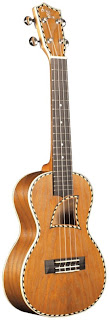I thought I would give my readers an insight into the less common techniques that are used in building some ukuleles. In the main, most ukes follow a fairly standard pattern in their build, that make them look like miniature spanish guitars. Many brands to try to play around with the shape, and of course there are pineapples and boat paddles and many others. But what about looking beyond the shape of the instrument at some of the details that go to make up the uke.
THE ZERO FRET
On the majority of ukuleles, the strings run between two key points, the bridge and the nut, at tension. The distance between the two of these is called the scale length and that distance needs to be exactly right in relation to the fret spacing to allow the ukulele to play in tune all over the fingerboard.
Some players have problems with this tuning (called Intonation) and it often stems from this distance being inaccurate. When you look at a ukulele nut, they are usually quite a lot wider than a fret, and the string sits in a slot cut in that nut. A well cut nut will have a "break" point within that slot which represents the point at which the string is held in tension down the neck to the bridge. If that point is cut badly, tuning may be an issue.
The zero fret was originally introduced in guitar making as a cost saving exercise. All it is, is another fret wire placed immediately next to the nut, set at a position where this fret represents the correct distance from the bridge for the scale length. Therefore, the nut itself is purely for holding the strings in the right spacings, but the zero fret holds the string at the correct length. As such it actually creates a way of eliminating accuracy issues at the nut end of the instrument.
Some claim that the downside is that you lose a bit of the ring and sustain from playing open strings, as each string now will naturally sound like it is being fretted even when open.
If you have seen a Flea or Fluke ukulele up close, you will see that they employ the zero fret.
SHAPED SOUND HOLES
Not all sound holes need to be round! Round is certainly the most common but we are increasingly seeing variations on this, some very imaginatively!
Koaloha ukuleles use a patented shape on their sound holes as you can see on my model below.
Other brands use the sound hole shape to reflect their names - take a look at the Eddie Finn ukes below
You may also have seen the Ovation Applause model ukes that take their design from their guitar big brothers
Finally, a big shout out to UK uke builder Darryl Cursley who came up with this beautiful sound hole idea for his wires uke.
PERSONAL SOUND HOLES
This is an intriguing idea, though not something I have played myself. A personal sound hole is a further hole (or holes) cut in the side of the instrument on the side that faces the ceiling. The idea is that the hole helps project the sound of the uke to the actual player as well as the audience.
Riptide ukuleles employ this design as do some of the Moore Bettah ukes
FLUSH FINGERBOARDS
On the majority of ukuleles you see, the fingerboard is usually another thin piece of wood that is glued on to the wood of the neck and as such it sits a little higher than the top of the instrument itself.
Many old ukulele builders would avoid this and actually set the frets directly into the top of the neck wood itself, meaning that the end of the fingerboard ran flush with the top of the instrument.
My Bruko black slimline uke employed this feature. It brings about two key changes over a normal fingerboard. Firstly the strings are a lot closer to the body of the instrument which I found made strumming easier (though less so, picking). It also allowed for some clever use of the top of the instrument for "fretting" notes beyond the end of the fingerboard into really high territory!
Well, they are the more common, uncommon features I have come across (if you know what I mean!) but there are probably countless other techniques and ideas that people are trying out. There are carbon fibre ukes, uke / banjo / zither hybrids, extra strings....
What unusual designs and features have you come across?















